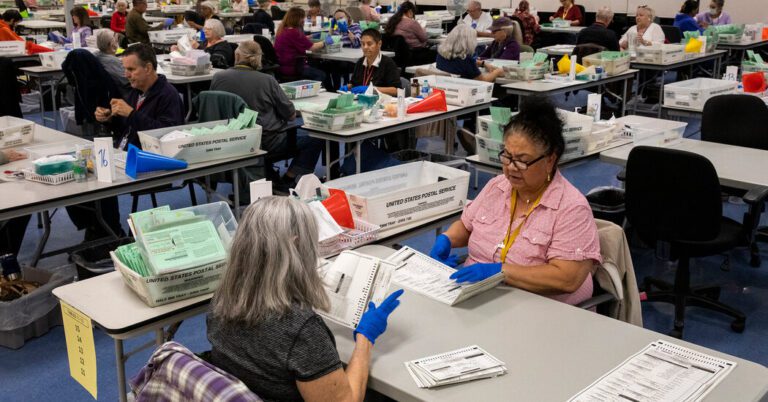
[ad_1]
Some states have also moved to pass new laws or strengthen existing ones.
“There’s a common denominator in many of these cases: election denialists announcing an intent to violently punish those who they believe have wronged them,” Gary M. Restaino, the U.S. attorney in Arizona, told reporters last month when he announced that a judge had sentenced an Ohio man, Joshua Russell, 46, to 30 months in prison for sending death threats to Katie Hobbs, then Arizona’s secretary of state, between August and November 2022.
In an apology letter to Ms. Hobbs, now the Arizona governor, Mr. Russell, from Bucyrus, Ohio, said he had been acting on disinformation he had consumed without vetting its accuracy.
“I started calling public officials whom I found disgusting,” he wrote to Ms. Hobbs. After the F.B.I. raided his home and charged him, he said, “I’ve never felt so foolish and ashamed.”
Perhaps the best-known example of disinformation leading to threats is what happened to two Georgia election workers, Ruby Freeman and her daughter Shaye Moss, after Election Day 2020. Rudolph W. Giuliani, who at the time Mr. Trump’s personal lawyer, publicly accused the women of participating in election fraud, leading to a torrent of threats against them. (The women won a defamation suit against Mr. Giuliani last year, with the jury finding that he should pay $148 million in damages, which sent him directly to bankruptcy court.)
Just one of the more than 400 threats Ms. Freeman received resulted in a prosecution, according to a person familiar with the case. The defendant, Chad Christopher Stark, 55, of Leander, Texas, was charged with threatening another Georgia official as well and received a two-year prison sentence.
[ad_2]